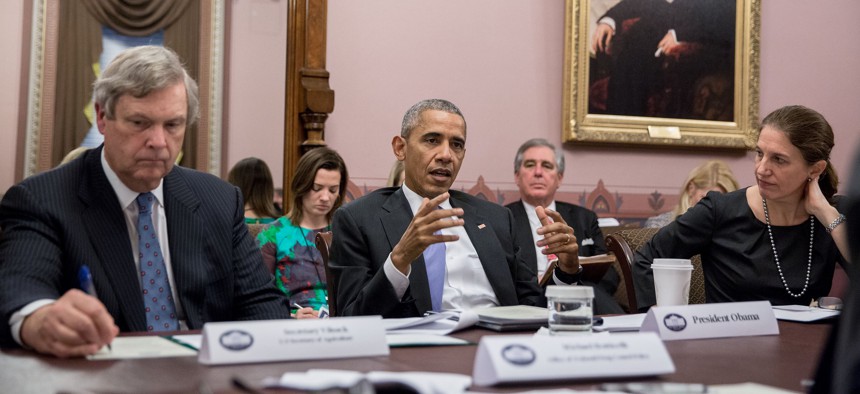
President Obama at a February 2016 meeting in the Eisenhower Executive Office Building with Agriculture Secretary Tom Vilsack and Health and Human Services Secretary Sylvia Mathews-Burwell. White House photo
As Clock Ticks, Appointees Try to Keep Career Feds Focused on Obama's Goals
With under 10 months to go in the Obama administration, agency leaders insist it's full speed ahead.
As the Obama administration winds down and a presidential transition looms, agency leaders insist they're committed to fulfilling the president's goals rather than trimming their sails as time grows shorter.
"This is the time in an administration's life cycle that we see finishing touches applied to key initiatives and attention paid to institutionalizing them so their shelf lives extend into the new administration," said Dan Blair, president and CEO of the National Academy of Public Administration. "The challenge for the political class will be to continue motivating career employees to keep up momentum and avoid the 'slow walk' that many initiatives inevitably face as we approach a change in leadership."
David Eagles, director of presidential transitions for the Partnership for Public Service, said "we've seen a very positive tone from the outgoing administration. They've begun formal discussions with agencies, which are beginning to prepare" basic timelines and selections of transition directors, with a formal interagency council planned for setup in May. "We'd recommend, at this point in the administration, pulling together senior leadership about what the priorities are for the next 10 months."
Eagles recalled two examples of departments that narrowed their ambitions during the homestretch. As the outgoing Clinton administration Health and Human Services secretary in 2000, Donna Shalala compiled a "refreshed set of priorities that was very doable in the short term," he said. She asked the National Institutes of Health for any ground-breaking high-impact research in, for example, preventing sudden infant death syndrome. That resulted in the creation of a public education kit.
When Eagles worked for Housing and Urban Development Secretary Steve Preston in 2008, "we literally did a 200-day agency turnaround plan that was more operational and managerial," he said. "It helped get buy-in from the career people."
Asked whether such a reorientation was underway at the Agriculture Department, press secretary Catherine Cochran insisted her colleagues are continuing to work “aggressively” on such issues as rural child poverty and substance abuse. “Rather than slow down, we will work harder than ever," she said.
Transportation Secretary Anthony Foxx said during a March 30 talk at the Center for American Progress that his department was focused on continuing efforts to steer infrastructure dollars and planning toward greater opportunities for minorities and low-income Americans left out by 60 years of pro-highway policies.
Foxx said he hopes "to create a national conversation on opportunity when John Q. Public in a city goes to meetings" with mayors and state officials. "Those conversations are incredibly important, and rest assured that there is plenty of background to them in what we're doing in terms of managing the department."
At the Homeland Security Department, a spokeswoman pointed to Secretary Jeh Johnson’s recent testimony before Congress. "Like last year, reforming the way in which the Department of Homeland Security functions and conducts business, to more effectively and efficiently deliver our services to the American people, is my overarching objective for 2016," he said. “We've done a lot in the last two years, but there is still much we will do."







